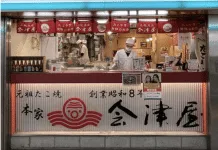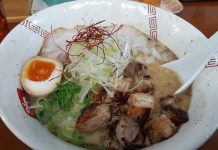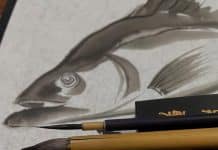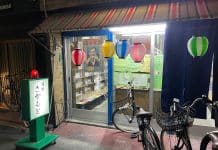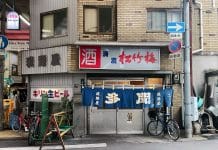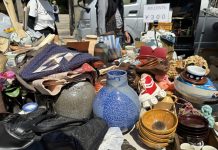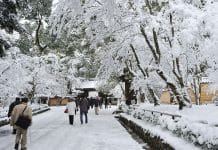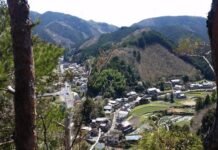Ever wondered what the life of a professional Jazz musician in Osaka is like? Wonder no further as Sem Sinatra chews the fat with the ever-ebullient Yoichi Tanaka, the jazz musician who duelled with the legendary Hino Terumasa and survived.
Yoichi Tanaka was born in Nara in 1972. After dropping out of the Spanish Department at Kansai Gaidai University in 1994, he moved to Boston, USA, and studied jazz at the Berklee College of Music, where he studied under Ken Cervenka, Jeff Stout, and Darren Barrett. Apart from performing as many as 5 times a week, he teaches and has appeared many times on Japanese TV including in the NHK morning drama Boogie Woogie.
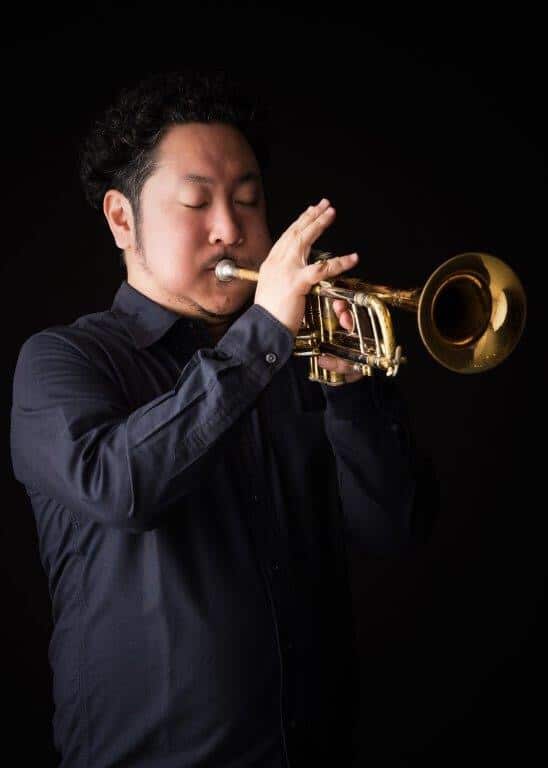
SS: It is often said in English that in the seconds before you die, your whole life passes in front of your eyes in a flash. I don’t think it’ll happen to you soon, but when it does, what do you think you’ll you see?
YT: Maybe I’ll see my family … yes, I’m that’s what it will be. I really enjoy living in the jazz world. I’m so glad I got to experience it.
SS: Of course, family. Is there anything else that comes to you immediately?
YT: If I die soon, it’ll be only good things, but if if I die when I get old, maybe there’ll be things like not being able to blow the trumpet any more, or my body getting really tired. If I were to die tomorrow, I’ll would probably die a very happy man.
SS: Actually the thinking behind the first question I asked was really “What is the first thing that pops into your head if I ask you the most amazing thing that has happened so far in your jazz life?”
YT: Playing gigs, the audience going mad, then after the gig, coming up to me and telling me how much they enjoyed it. Sometimes, a young trumpet playing student will travel a long way to see the gig. They’ll say something like “Mr. Tanaka, that was AMAZING!”. Then I go and get drunk and the next day I feel like I might have died, but I’m still smiling.
SS: So it’s when you thought your performance was pretty good AND the people who heard it also say how good it was and how much they enjoyed it?
YT: Yes, exactly. But it isn’t always like that. Sometimes it’s no good at all.
SS: Yes, I can understand how much better that is than playing a great gig with only three people there, two of them drunk and one asleep. But I bet that doesn’t happen very often.
YT: Occasionally it does! Even at a big band concert, where they’ll usually only be one solo for the trumpet, it can happen. I go to the front of the band, play the solo, and if it comes out really well, I feel, YES, I did it! At that kind of gig, I get emails afterwards from people who have really enjoyed it. But there are times when I mess up too.
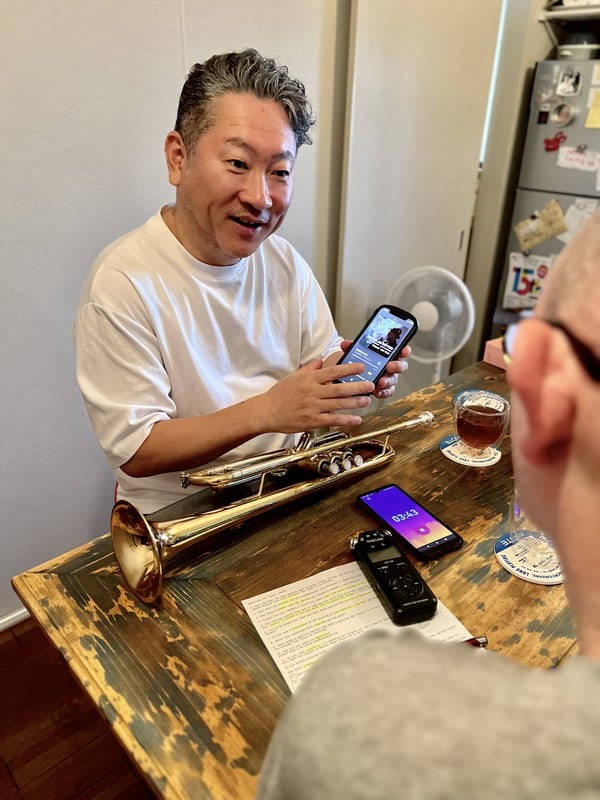
SS: On the days when it goes really well, do you wonder where the magic came from?
YT: Maybe from a couple of days before that kind of success, my lips are in really good condition and my chops are great. On other days it can be the worst day of your life. It varies all the time. Jazz improvisation is a skill that builds up over time.
(“Chops” is the word used by jazz musicians to describe a musician’s level of technique in terms of the ability to execute music physically on a particular musical instrument)
SS: Are you also saying that it’s a combination of many things, such as your mood, the weather, the state of your lips, rehearsing, all lining up nicely to make a performance that’s so much better than the previous ones?
YT: Yes, but sometimes it can also come at the end of a run of bad events, suddenly out of the blue. The day before, there were no customers and my performance wasn’t very good, and then BANG! It’s fantastic. It could be just having a good chat with the musicians you’re playing with that day or something else completely unconnected.
SS: And of course, for jazz musicians, it’s often different combinations of people every day, so if the members gel well that can also be very uplifting for everyone.
YT: Yes, that’s it. It’s not about just one person, so it’s great if there’s a good combination of musicians.
SS: In the performances that you do, what percentage are really good, what percentage are just OK, and what percentage are “I wish I hadn’t done it” or “I don’t want to work with that person again”.
YT: If I were to play 10 songs every day at a gig, then the quality of them varies. Not all of them are 100 points, some are 80, some are 30. That kind of thing. If it’s bad on a particular day, I try not to think about it.
Cheap, excellent Jazz in Osaka is everywhere
SS: To change the subject slightly, can you introduce some of the jazz world in Osaka for people who don’t often go to jazz gigs, and for people who only be in Osaka for a short time, maybe on holiday. I’ve been in Osaka for about 25 years and I think the level of jazz musicians’ competence in Osaka is very high, and I think it’s possible that if you choose a club jazz club carefully, or get a good recommendation, it doesn’t have to be expensive. You can see really good musicians at some jazz clubs for around ¥2500 sometimes. Some venues are more expensive, but it’s not necessary to pay a lot of money to experience a fantastic jazz session in Osaka.
YT: Yes, there are a lot of very reasonably priced clubs, including Sub where you came to see my gig a while ago. The Tanimachi 9-chome jazz club Sub has been taken over by Ro Hasegawa, who’s one year younger than me. It’s full of good young musicians. It’s cheap, too. You can pay just to see one set.
SS: How much is it? I don’t remember how much I paid.
YT: From ¥1800 for 1 set at lunchtime up to about ¥3500 for 2 sets at night.
SS: That’s very reasonable.
YT: You can order food and drinks as well if you want to, but if you don’t want to, that’s fine too. Just like going to a movie. You can just watch the jazz and pay ¥1800 for each set you watch.
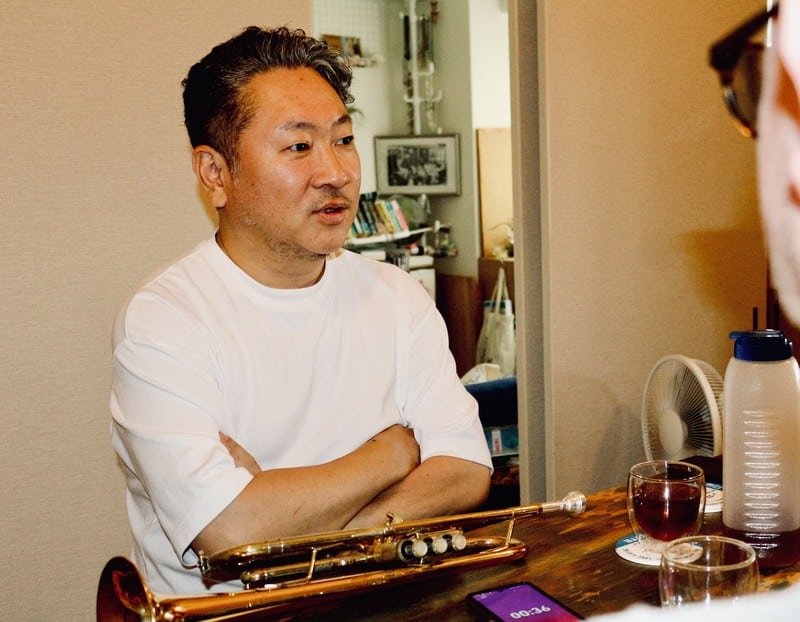
SS: Anywhere else?
YT: Recently, there’s a new place in Shinsaibashi called “Proust”.
SS: Isn’t Shinsaibashi a bit expensive to see Jazz? Expensive beers?
YT: The music charge is actually a bit cheaper. And under 25’s get in free! They want to support young musicians, so a lot of young musicians play there as well, and they don’t take music charge money from young customers at all!
SS: Wow, that’s unusual.
YT: Yes, maybe it’s a first in Osaka. The music charge is from ¥1400 to ¥1800, but free for under 25’s if you show your ID.
SS: Nice. How about Interplay8 in Nishi Tema, known to most people as “Hachi”?
YT: I haven’t been there recently.
SS: It’s usually a tipping system. You put some cash in the jar for the musicians. I’ve seen some great musicians there. Great atmosphere.
YT: At Sub, a lot of young musicians also come to sit in and play. It’s very friendly.
SS: What’s it like when younger musicians sit in?
YT: All the young musicians that come are usually pretty good. If somebody isn’t very good, the owner will give them some good, practical advice.
SS: OK. Anywhere else?
YT: Donna Lee in Doubutsuenmae is also very good, and there are other places such as Royal Horse in Umeda.
SS: That’s a little bit more expensive, isn’t it?
The life-changing moment
SS: I’d like to ask about your development in jazz. When you were younger and at university, you were studying Spanish, when suddenly your life changed. Can you tell us a little bit about that?
YT: The first year I did okay and passed everything. The second year, I hardly attended any classes. I went to the brass band clubhouse all the time and smoked tobacco with the older students. Actually, it was there that I became the conductor of the classical music orchestra. Then one of my seniors, a trumpet player, told me to stop conducting and to start listening to jazz.
SS: By the way, how old were you when you started playing the trumpet?
YT: I started in junior high school. But it was only later that I became really interested. I played in the brass band at university, but then my seniors played me jazz, jazz, jazz all the time. I went to the Mount Fuji Jazz festival around that time too. I stopped attending classes after two years, I think. I quit university for a year. I was delivering newspapers near Nara and doing jazz part time. I practised a lot and got help from my parents and relatives.
SS: So how did you get into Berklee College of Music?
YT: I went to visit somebody who had been there and asked him what I needed to do to get in. I had to record three of my improvisations on a cassette tape and send it along with recommendations from school, teachers and music teachers, my English teacher, etc. I was very lucky. I got a scholarship.
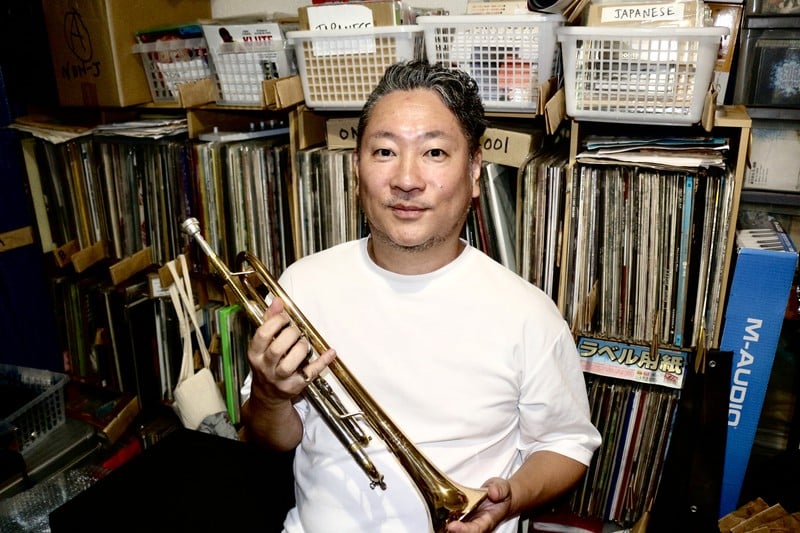
SS: That’s great. You were really lucky!
YT: To the teacher who listened to my tape, I want to say THANK YOU!
SS: Your life did a complete 180° turn.
YT: Yes, it did. At that time, I was about 20 years old and at that time I was terrible at improvising. But I had a lot of confidence and I thought, okay I’m going to America. 4th September 1994. Kansai International Airport, the day it opened! I got on a plane and went to Boston. That was 30 years ago!
SS: What was it like living in America for three years?
YT: It was my first time living on my own. At first I lived in a dormitory and my roommate was a rock musician called Maylon. He would come home in the middle of the night while I was sleeping and throw a big bunch of keys on his desk and wake me up. Then he would pull off his boots and throw them across the room. He was the worst roommate I ever had. I had to write a letter to the school telling them that I couldn’t sleep because of his behaviour and asked them to move me. They moved me to another dormitory and I shared a room with a Korean pianist. He was such a nice guy. He called his family every day, a completely different kind of person.
Then in 1996 in my third year, I had a Japanese guy as a roommate. You’ll never guess who it was. It was the guy who had introduced me to the music of Lee Morgan at University! In Japan, I was two years his junior but in Boston I was two years his senior, so it was a bit weird.
Berklee College of Music had had 2000 students. About 200 of them were Japanese, so one in ten. There were so many Japanese speakers there that I didn’t have to bother to try to speak English. Many of the musicians from Tokyo went back and became leaders of their own bands.
I feel a bit like a chameleon
SS: You are also the leader of the Yoichi Tanaka Trio, aren’t you?
YT: That’s right.
SS: So when you organise the gig, it’s the Youichi Tanaka Trio but if Takeshi Shimizu calls you, the band name will be under his name, or maybe EDF?
YT: Yes, but I’m not often asked so I’m not usually the band leader.
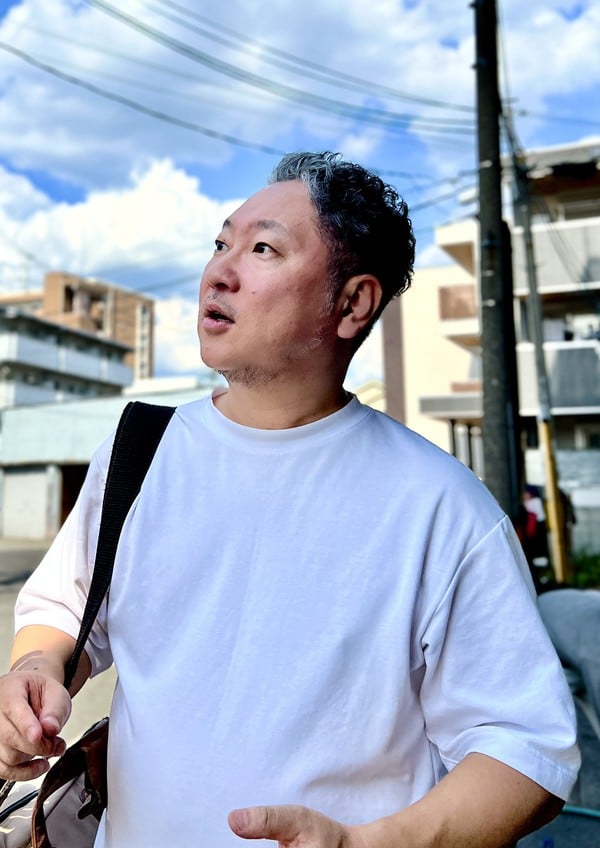
SS: Why is that?
YT: Because I like to play different kinds of jazz all the time. I like being in a big band, then a west coast type jazz band, then in EDF, then appearing as a duo. I’m the type that can fit in various bands.
SS: And you prefer being in that situation?
YT: Yes, I do. I also prefer to play other people’s songs. Some people prefer to be the leader, playing their own originals, releasing their own CDs, doing their own own tours. Perhaps I’m not that kind of person.
SS: All musicians have their own styles, and your style is to play in all sorts of different bands, and not but not necessarily always as the leader. If that what makes you feel comfortable and allows you to enjoy music the most then that’s fine, isn’t it?
YT: I feel a bit like a chameleon, changing colour all the time. My customers often ask me, why don’t you have your own CD or why don’t you have your own band? I get asked all kinds of questions like that.
SS: You’re not that motivated to release your own CD?
YT: Not at the moment. I used to write more original material. Then something happened. When I wrote something, it sounded too much like someone else’s music.
SS: On the other hand, the other day when I was at your gig at El Nague in Juso, it was a very unusual situation because the band that you were playing in played only originals composed by the pianist Takeshi Shimizu. It was probably the first time I’d been to a jazz gig where no standards were played at all. While I was listening to his music, because it’s jazz music, and jazz has certain forms, I often felt that I had heard the song before, though it was the first time I had heard each one. I think the first time you listen to someone’s music, you notice the things which resemble other music you know, because that’s what your brain does to try and help you enjoy the music, but then you start to notice the originalities and the idiosyncrasies of that music and you can enjoy it for what it is. That gig was really good.
YT: He’s written so many songs, so many pieces, so many titles that you could easily make a book from them.
SS: Does he make and release his own CDs?
YT: Yes, on his own label with the saxophone player Tsutomu Takei. I think there are about five albums released under the band name EDF. Maybe I’ll start writing more songs again. When I play live, it always feels good to put in a song which is not a standard, but I don’t want to play all originals.
SS: When I go to a gig, personally I like to hear both. Maybe three quarters standards, one quarter originals. I want to hear the musicians’ ideas, their real spirit too.
YT: At the moment I’m getting a lot of work with a lot of bands so I’m very happy. But in the future, I think I will do more leader work.
The daily life of a jazz musician
SS: Next question. What is the daily life of a professional jazz musician in Japan like? I can’t imagine it at all.
YT: After getting up in the morning, I warm up first (on the trumpet). Do some housework. Teach a lesson. At night, I perform. I also teach young kids, and on Mondays and Tuesdays, I go to Osaka University of Arts and teach there too. I also give lessons at a place called Dolce Gakki in Umeda. Some days we have rehearsals. And most nights there are gigs. If my chops (embrouchure muscles) are tired, it hurts to practice so it’s important to take it at the right pace.
SS: So, taking everything together, rehearsals and gigs, how long can you play without getting tired? About four hours?
YT: In a big band, the rehearsals can be quite long, maybe three hours. Then an hour’s break for dinner, then two sets, another three hours. Altogether it can be as much as six hours.
SS: That’s amazing!
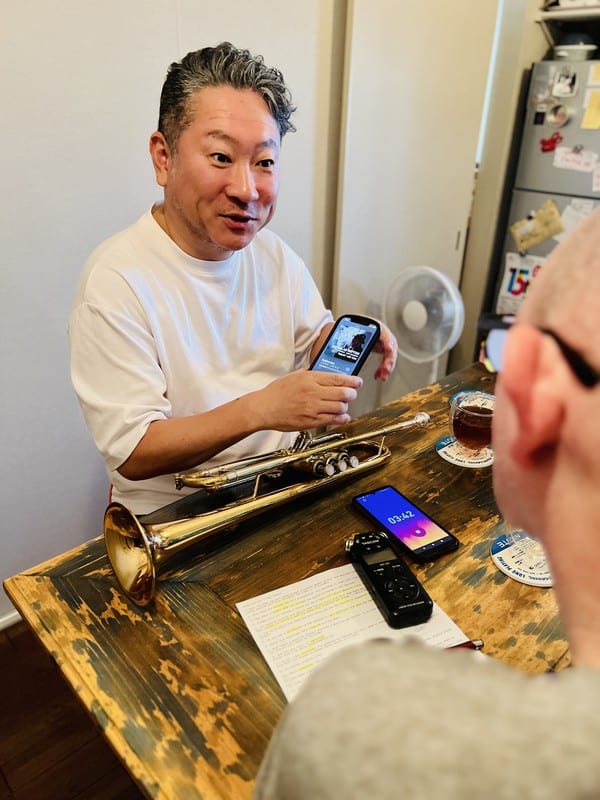
YT: There are times when my mouth really hurts, the muscles are tired.
SS: Of course there are a lot of muscles inside your mouth, but most people don’t use them that much. Does it feel like when you exercise too much and your arms and legs hurt?
YT: Yes, it’s exactly like that, but the mouth area is very sensitive, so the pain is going to be double, triple or quadruple.
On the first Friday of August, I did a gig with the Arrow Jazz Orchestra in Umeda. It was Latin music with songs that use a lot of power. We had a rehearsal from 2:30 to 5:30, then 2 live sets. The next morning my mouth hurt so much that I had to cancel my lesson and apologize to my student. I could hardly even play for that evening’s gig. I couldn’t warm up. I just had to play the gig and blow really softly.
So some days I don’t play. Some days I just listen to music and start drinking from midday. It really varies.
SS: So teaching is quite a big block of your time?
YT: Yes, but there are also a lot of rehearsals and gigs. Most jazz musicians teach music somewhere. Or maybe they’re composing music. That kind of thing. In the evening, if I’m not out working, I’ll have a few drinks, watch baseball, spend time with my family.
NHK dramas
SS: You’re also involved with various NHK dramas such as Boogie Woogie? What’s that like?
YT: When I went to the shoot for the first time, I woke up at 4:30 am and I was at NHK studio by 6 am. I was so sleepy I had to catch the first train.
They tell you to go to the makeup room first. In the beginning, it’s a bit of a surprise, but afterwards you feel better. I felt like I’d entered a completely different world.
SS: I’m sure there’s a lot of waiting around so it can be a bit boring, but I’m sure it’s a good connection to have. You know how to truthfully represent all aspects of the behaviour of a musician and I’m sure you can give lots of advice. Is that something you had to do?
YT: Yes. When I started, I was playing in the orchestra, but actually that sound had already been played by Tokyo musicians who record all the music first, and we were just miming to it. But it looked terrible, so Mitch (Yasuda), another trumpet player and adviser suggested that we should really play properly, really blow our trumpets, play our instruments. They listened to him and that’s what we did, and it looks much more realistic. The sound we made wasn’t used in the show, but at least it looks believable.
So we play for a bit, and then they change the camera position and we wait and then they shoot some more. We spend a long time waiting around and normally finish at about 9:30 pm so it’s a very long day.
SS: Has it been good for your career?
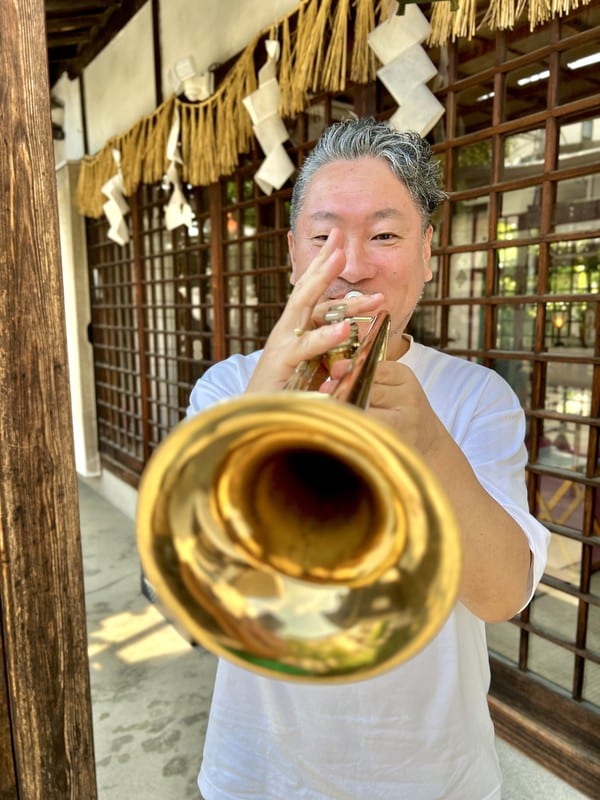
YT: Yes, it has. It has really helped. I get a lot of emails about it. “I saw you on TV!”, that kind of thing.
When the programme is broadcast, there’s a lot of information on all the social networking sites. So it’s good exposure.
SS: And I guess once they have your information, whenever they need a specialist, they can call you.
YT: Yes, that’s right.
SS: If they ask, will you do it again?
YT: Yes, of course. Even my friends who live a long way away in Hokkaido and Okinawa watch the NHK morning dramas so I feel feel it’s really really important. I’ve been on a few other TV programs as well.
Musical rules
SS: A slightly different question. Do you have any musical rules?
YT: When I listen to a CD, I like to listen to an entire album, and the albums I like most are those with a lot of variation. Some slow songs,some fast songs, some waltzes, some ballads, a bit of Latin music. If I get bored, I’ll change the music. So when I’m putting together a set list, for a gig, I do the same thing. But if I do that the same thing every time, I’ll get bored of that too so I always try to do something different. Maybe start the gig with a waltz, or a very dark tune, or a very slow, one slow one. I like to change it up. I think of it as a sense of balance.
But the musicians that I work with often say that’s not right. If I’m playing a gig and the tempo song is the same as the previous one, or if it’s in the same key, I say are you sure about that often? Often they will say yes, it’s fine. But I think it’s really important to have a sense of balance.
SS: If it’s the same key or the same tempo, the listener’s brain will probably get bored, even if they don’t understand why. Is that what you mean?
YT: Yes. Also in terms of improvisation, when I’m doing it, I don’t think about it, when I’m scatting or making blind noises blowing noises, I just do it without my brain being involved at all. But when I’m teaching, the students want detailed answers. They want an explanation. They want precise instructions.
I tell them it’s about listening, balance, sense. One of my students said: “Don’t use the word sense, please explain it properly in words”.
SS: I’m sorry, but I don’t think somebody who thinks like that will ever be a musician.
YT: I worked really hard at improvisation at first listening to other musicians, to their solos, to try and get the atmosphere right. At the beginning, I knew I was going to have to copy a lot of stuff, and transcribe it in order to learn. But after that, it’s up to you. I feel like all the artists I like belong to the same family tree. They all use the same kind of words. The phrases they use are very similar, and so I’m eventually learning to put more of myself into my improvisations, putting in phrases I like.
SS: Which family are you from?
YT: Clifford Brown, Lee Morgan, Kenny Dorham. Donald Byrd. Blue Mitchell. All of them. Art Farmer. And of course, Miles Davis. My favourite phrase is that we are all a family. We are all a little bit alike.
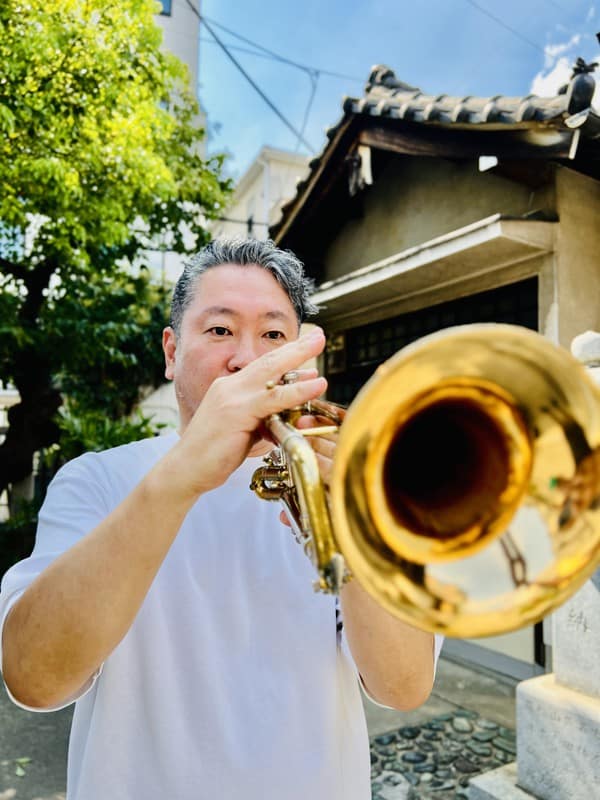
SS: When I heard you play at El Nague, I felt like I could hear a bit of Chet Baker in your playing.
YT: Of course, I listen to all of those musicians from time to time, then go full circle.
Some people really like modern jazz. But I am more fond of jazz music up until the 1990s or 2000, not so much polyrhythmic and music in seven time. I think my ears might be getting less receptive to new forms.
SS: The body decides what it likes, doesn’t it? Not the brain.
YT: Occasionally, when I’ve been invited to do that kind of gig, I couldn’t improvise naturally. I can only do my own thing. Earlier on I said that I like to be a chameleon, so I still manage to do sessions and gigs with young musicians.
SS: When you work with younger musicians, do you take more risks?
YT: Maybe, but young people nowadays, when they write new songs, the parts are generally not that difficult. I love most of the musicians in Kansai and I know we can work together well.
Going back to what I was saying earlier, I feel like I’ve chosen what I’m comfortable with.
Duelling with Terumasa Hino
SS: One question I really want to ask you. Once you played with Hino Terumasa at a festival, didn’t you? I found the clip on YouTube. When you did that how nervous were you?
YT: I was young. I only remember having so much fun. That was nine years ago. I’m getting older and my mindset is changing. But at that time, I wasn’t so nervous. I was much thinner too! Ha ha ha.
SS: I could see that he really enjoyed your playing.
YT: I listened to the phrases that he played and tried to imitate them and throw them back at him.
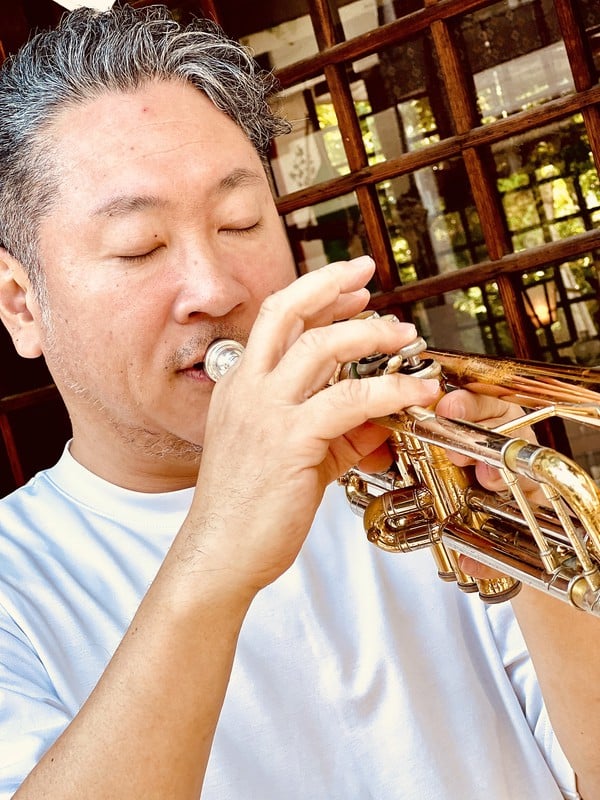
SS: But it was more than that. When you improvise live at a gig, you only have one chance. And when you have more experience, for a jazz musician, it seems like the brain is being bypassed.
YT: It’s impossible to say where the inspiration comes from at the time, but sometimes it can be very unusual and people who are listening are amazed, and really enjoy it.
SS: You never know what’s going to happen in that moment, and I think that’s what a lot of people love about jazz. The unpredictability.
YT: Hino is number one. He’s the fastest and the loudest and the highest. So all I could do was to try not to lose. I tried to use some of my own phrases, saying to him: “Do you know this one, Mr. Hino?”
Practice practice practice
SS: When you’re practising, how do you normally practice?
YT: It’s difficult to make sound from a trumpet so it’s important to warm up properly, and there are all kinds of warming up exercise. Quite difficult stuff, classical, etudes and that kind of stuff. It takes a lot of stamina. I also practice playing just one note, breathing all the time while I’m doing it, making crazy rattling noises with my fingers. It’s already hard.
SS: So When you practice, you can’t do just what you want to do? You have to do the exercises that will make you become a better player?
YT: When student starts, you can’t teach them immediately about improvisation. You have to teach them the exercises first.
SS: Warming up time for playing the trumpet is usually about half an hour?
Dentists vs trumpet players
YT: Right, yeah. And there are a lot of gaps in my teeth these days. When you go to the dentist and have your teeth cleaned, you get larger gaps between your teeth and the next day it’s really hard to play.
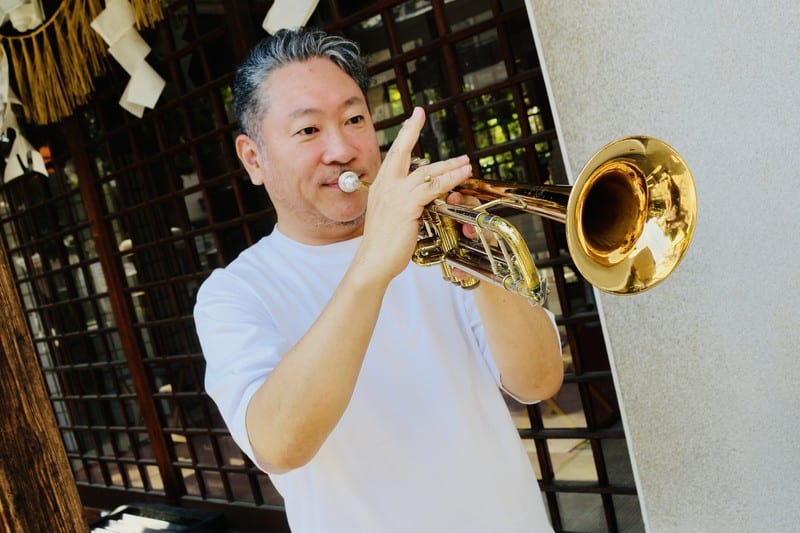
SS: The day before and the day after the dentist are completely different?
YT: Yes. If you go to the dentist and then clean the inside of the trumpet as well, it’s even more difficult.
SS: That’s so interesting. I would never have thought about that.
YT: If you lose a tooth, it’s probably going to be a really big deal.
I wonder until what age I’ll be able to play properly. Of course, I’ll still be able to play when I’m an old man but it’s harder to play the trumpet when you get older than other instruments. I might not be able to keep going when I get older.
SS: How old were Miles Davis and Chet Baker? Chet especially was working hard the whole time until he died, wasn’t he?
YT: Maybe until he was 70? (Actually he died at 58, played & recorded until very near end. But he looked 70 years old)
SS: How about Miles?
YT: I think he was younger (Actually he died at 65. Miles Davis played his final concert on 25 August 1991 at the Hollywood Bowl. Soon after, he entered hospital, where he died on 28 September.)
SS: Let’s stop there on that positive note!
I hope to be able to hear you play for many more years, and I recommend that our readers go to see you play!
You can find out Yoichi’s schedule below at his website:
Yoichi Tanaka official website: https://tanaka-yoichi-tp.amebaownd.com/
The clubs:
Sub in Tanimachi 9-chome: https://www.subjazzcafe.com/
Proust in Shinsaibashi: https://www.proust-jazz.jp/
Donna Lee in Doubutsuen-mae: https://www.facebook.com/p/%E8%A5%BF%E6%88%90%E3%82%B8%E3%83%A3%E3%82%BADonna-Lee-100063623707911/
Interplay8 in Nishi Tenma: https://www.facebook.com/hachi.interplay
El Nague in Juso (amazing Spanish food and occasional Jazz gigs): https://www.facebook.com/profile.php?id=100060316220728



